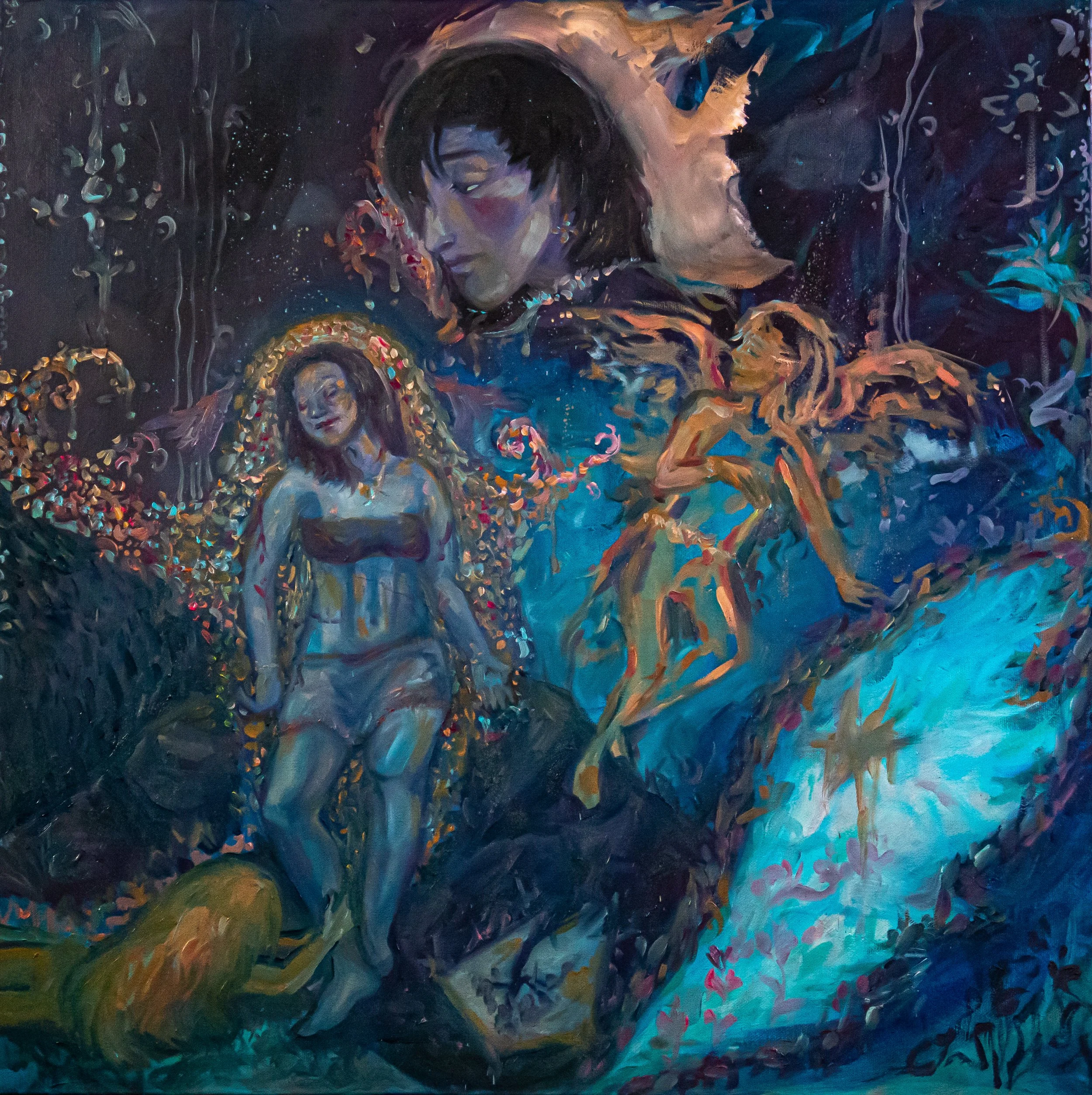Artist: Sandy Hanna
Tyrese L. Coleman, How to Sit
Grandma slapped my foot, uncrossing my legs. You think you grown? Sitting in my house with your legs crossed like you a damn woman. Her bleached nurse’s uniform was starched, stiff as stale white bread stuck to her syrup-colored skin. She confronted me, hands on hips, waiting for a reason, waiting for me to open my mouth.
We argued—something to do with the phone or something to do with a boy or something to do with me walking around her house, around men, with no bra, or with my mother—who lived with her man, never with my grandmother, even as a child, even as a baby—coming by her house pregnant and tall, light-skinned and mean.
Or something to do with their fight—Grandma wanting to get my mother back by messing with me, I don’t know. The fight where I watched my grandmother kick my mother’s swollen belly. The fight where my mother, a seventy-pound and eight-inch advantage, pushed my grandmother, held her wrists above her head and yelled, I’ll put my finger in your face if I want.
Or was the argument really about me? Grandma’s forty-seven-year-old body still wore a size eight, but the small titties sagged. And she was short—much shorter than my thirteen-year-old frame, one with plump breasts a man fondled during one of her house parties—my fault, she said—and legs instigating anger, making her smack them open. Jealous.
She waited for a reason. Virginia Slim Ultra fierce against burgundy lips, they twisted at the only thing she had over me—I lived in her house. Don’t you forget it. And, I was not going to sit in front of her with my legs crossed like a grown-ass woman either.
A picture of her dancing: legs cut from frame but hips jutting, arms outstretched, torso exposed, hair solid gold, sweater sucked on, hand clutching a drink and cigarette, red eyes slanted towards an afroed man. Grandma partied with Marvin Gaye in DC. Boogied at Studio 54 in NY. Stayed places her family had only seen on TV. She was wild.
She disappeared at 16 after my mother was born. Grandma’s older sister is who my mother calls “Mama.” My grandmother returned to the country, to her home, just twice, to drop off two sons. She never did settle down, always on the move.
Diabetes brought her back for good.
When they took her leg, I didn’t see the stump. Not naked anyway. I imagined it purply-green, swollen, puss-filled, and, thank God, she kept the little white stocking cap at the end as if it were the head of a newborn baby.
She wasn’t crippled. Still partied. Sold shots of whiskey in the back room—“my” room—for fifty-cents. The house full of smoke, I leaked water in my eyes from toilet paper I wet in the sink. In the living room, bodies gyrating, and Al Green singing he was so tired of being alone.
Still saw the married white man too. The one who looked at me funny, like the men who touched me at her parties, legs crossed or not, my fault or not. When he came over, she made me leave. When he left, she suddenly had money for Captain D’s.
But she never left the house. Not even to feel the outside. And where was she going anyway?
I am sitting on her nursing home bed. Grandma adjusts herself, raising the stump as if she intends to cross her thighs. Instead, she lowers it, stretching her full leg out. Her toenails are close to my leg. They are daggers. And if they were attached to her fingers, and if she were forty-seven and not sixty-seven, she would use them to scratch my face for pitying her.
Thirty minutes away from here, down I-95, past the truck stop, left on the dirt road, about a mile in, you will see a “For Sale” sign and the neighbor’s goats eating her neglected grass. She wants to go home, she says, more than once. But, Medicare will allow her just the one.
My mother braids my grandmother’s hair. It is a limp, flat sheet. The stump is stripped bare. It moves side to side as if groping for something lost. I lean back, ankle resting on the opposite knee. It is only us women, but Grandma says she wishes I would learn how to close my legs.













